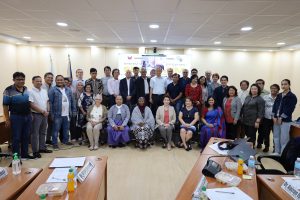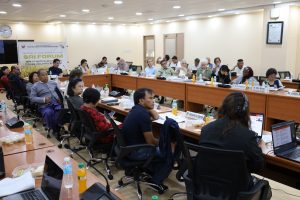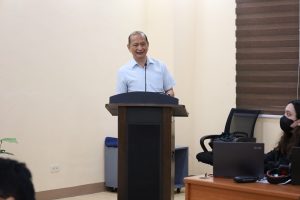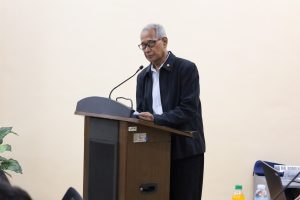
Recommendations to promote System of Rice Intensification (SRI) adoption—such as increased the budget allocation for organic inputs, inclusion in research and development initiatives, and enhanced information campaign—were among the outputs during the SRI Forum facilitated by the Philippine Council for Agriculture and Fisheries (PCAF).

Over 130 participants took part in the hybrid conduct of the country’s first SRI Forum last October 20, 2023. The participants, 38 of whom attended the activity on-site at the PCAF Apacible Conference Room, included private sector stakeholders from the PCAF National Sectoral Committees (NSCs) and Regional Agricultural and Fishery Councils (RAFCs), Small Water Irrigation System Associations, and SRI farmer practitioners from various provinces.
SRI is a climate-smart, agro-ecological methodology for increasing the productivity of rice by changing the management of plants, soil, water, and nutrients. As conventional rice production practices become increasingly unprofitable, many farmers are turning to SRI as a means to continually enhance and embrace a more efficient and effective approach to rice cultivation.

In his inspirational message, DA Rice Industry Development Undersecretary Leocadio Sebastian stated that while the Philippines has been left behind by other countries in terms reaping the benefits of SRI, Sebastian believes that the SRI has a big future in the Philippines.
Proving the government’s commitment to SRI, Usec. Sebastian shared that a budget of P250 million was approved by the House of Representatives for its implementation by the DA. Still, he expressed hopes that a bigger budget would be allocated for SRI in the future.
But in order for local farmers to maximize the benefits of SRI, Sebastian emphasized that it is equally important to implement farm clustering. This would allow them to negotiate for more premium rice prices, thereby improving their income.

According to RAFC Zamboanga Peninsula Vice Chairperson and SRI practitioner Adelberto Baniqued, there are already various initiatives to implement SRI around the country, but financing is what prevents it from being widely practiced. “Malaki po ang maitulong [ng SRI] lalong lalo na yung sinabi ni Usec. kanina na talagang sinusuportahan nya ang SRI sa Pilipinas, napakaganda yun,” he said.
Representatives from international academic and research institutions served as resource persons for the activity. Among the topics they discussed were the innovations and policy gains in SRI and country case studies on the benefits and challenges in the promotion, adoption and scaling-up of SRI in India, Indonesia, Chile, and the Philippines. | BM











